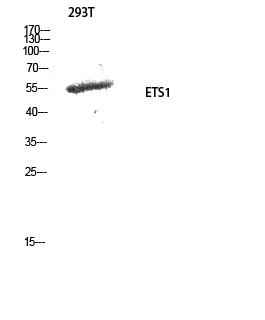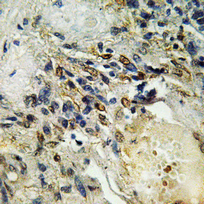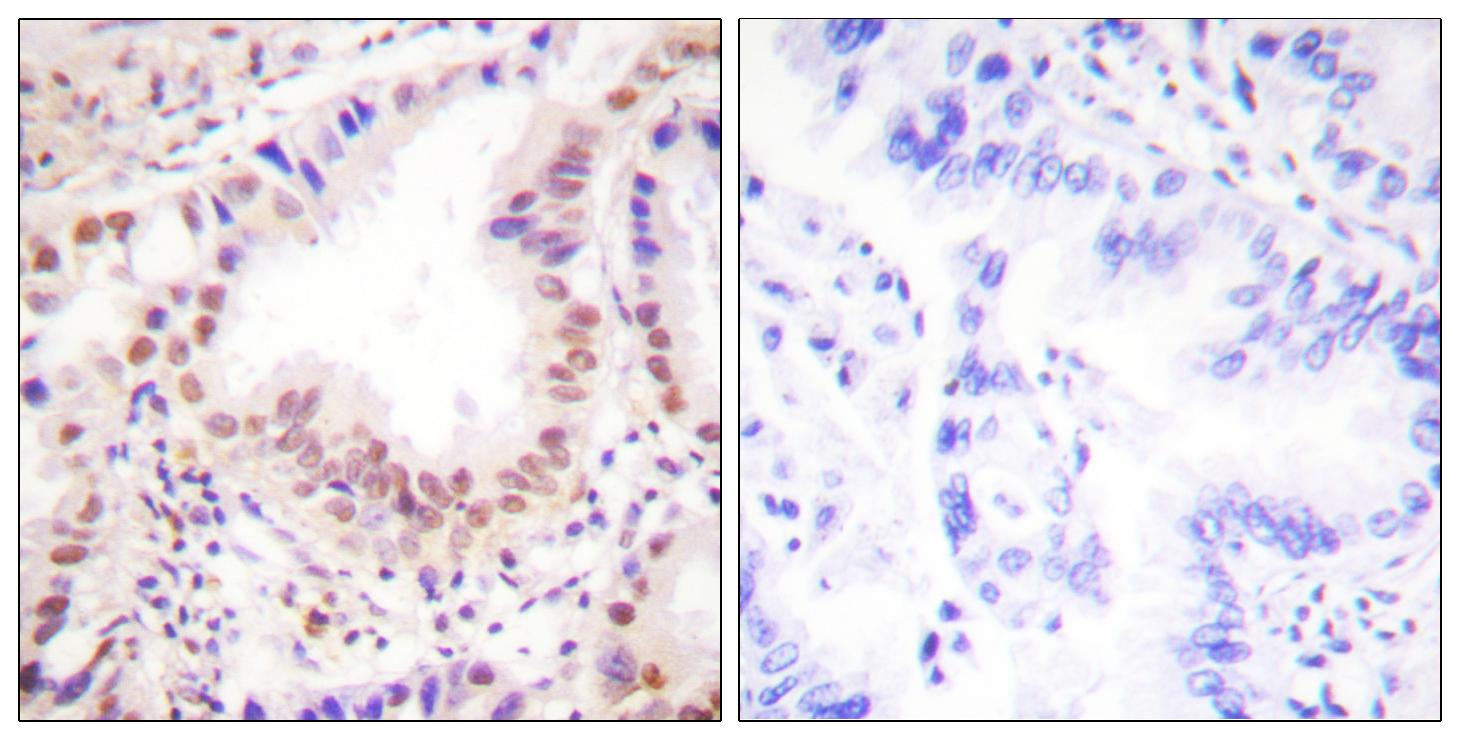ETS1 Polyclonal Antibody
- Catalog No.:YT1644
- Applications:WB;IHC;IF;ELISA
- Reactivity:Human;Mouse;Rat
- Target:
- ETS1
- Fields:
- >>Ras signaling pathway;>>Cellular senescence;>>Human T-cell leukemia virus 1 infection;>>Pathways in cancer;>>Renal cell carcinoma
- Gene Name:
- ETS1
- Protein Name:
- Protein C-ets-1
- Human Gene Id:
- 2113
- Human Swiss Prot No:
- P14921
- Mouse Gene Id:
- 23871
- Mouse Swiss Prot No:
- P27577
- Rat Gene Id:
- 24356
- Rat Swiss Prot No:
- P41156
- Immunogen:
- The antiserum was produced against synthesized peptide derived from human ETS1. AA range:11-60
- Specificity:
- ETS1 Polyclonal Antibody detects endogenous levels of ETS1 protein.
- Formulation:
- Liquid in PBS containing 50% glycerol, 0.5% BSA and 0.02% sodium azide.
- Source:
- Polyclonal, Rabbit,IgG
- Dilution:
- WB 1:500 - 1:2000. IHC 1:100 - 1:300. IF 1:200 - 1:1000. ELISA: 1:5000. Not yet tested in other applications.
- Purification:
- The antibody was affinity-purified from rabbit antiserum by affinity-chromatography using epitope-specific immunogen.
- Concentration:
- 1 mg/ml
- Storage Stability:
- -15°C to -25°C/1 year(Do not lower than -25°C)
- Other Name:
- ETS1;EWSR2;Protein C-ets-1;p54
- Observed Band(KD):
- 50kD
- Background:
- This gene encodes a member of the ETS family of transcription factors, which are defined by the presence of a conserved ETS DNA-binding domain that recognizes the core consensus DNA sequence GGAA/T in target genes. These proteins function either as transcriptional activators or repressors of numerous genes, and are involved in stem cell development, cell senescence and death, and tumorigenesis. Alternatively spliced transcript variants encoding different isoforms have been described for this gene.[provided by RefSeq, Jul 2011],
- Function:
- disease:ETS is responsible for erythroblast and fibroblast transformation. The juxtaposition of the interferon and c-ETS-1 proto-oncogene may be involved in the pathogenesis of human monocytic leukemia.,function:Transcription factor.,PTM:Sumoylated on Lys-15 and Lys-227, preferentially by SUMO2; which inhibits transcriptional activity.,PTM:Ubiquitinated; which induces proteasomal degradation.,similarity:Belongs to the ETS family.,similarity:Contains 1 ETS DNA-binding domain.,similarity:Contains 1 PNT (pointed) domain.,subunit:Interacts with MAF and MAFB (By similarity). Binds to DAXX. Interacts with UBE2I.,
- Subcellular Location:
- Cytoplasm . Nucleus . Delocalizes from nucleus to cytoplasm when coexpressed with isoform Ets-1 p27. .
- Expression:
- Highly expressed within lymphoid cells. Isoforms c-ETS-1A and Ets-1 p27 are both detected in all fetal tissues tested, but vary with tissue type in adult tissues. None is detected in brain or kidney.
- June 19-2018
- WESTERN IMMUNOBLOTTING PROTOCOL
- June 19-2018
- IMMUNOHISTOCHEMISTRY-PARAFFIN PROTOCOL
- June 19-2018
- IMMUNOFLUORESCENCE PROTOCOL
- September 08-2020
- FLOW-CYTOMEYRT-PROTOCOL
- May 20-2022
- Cell-Based ELISA│解您多样本WB检测之困扰
- July 13-2018
- CELL-BASED-ELISA-PROTOCOL-FOR-ACETYL-PROTEIN
- July 13-2018
- CELL-BASED-ELISA-PROTOCOL-FOR-PHOSPHO-PROTEIN
- July 13-2018
- Antibody-FAQs
- Products Images
.jpg)
- Western Blot analysis of 293T cells using ETS1 Polyclonal Antibody diluted at 1:1000 cells nucleus extracted by Minute TM Cytoplasmic and Nuclear Fractionation kit (SC-003,Inventbiotech,MN,USA).

- Western Blot analysis of 293T cells using ETS1 Polyclonal Antibody diluted at 1:1000 cells nucleus extracted by Minute TM Cytoplasmic and Nuclear Fractionation kit (SC-003,Inventbiotech,MN,USA).

- Immunohistochemical analysis of paraffin-embedded Human breast cancer. Antibody was diluted at 1:100(4° overnight). High-pressure and temperature Tris-EDTA,pH8.0 was used for antigen retrieval.

- Immunofluorescence analysis of HeLa cells, using ETS1 Antibody. The picture on the right is blocked with the synthesized peptide.

- Immunohistochemistry analysis of paraffin-embedded human lung carcinoma tissue, using ETS1 Antibody. The picture on the right is blocked with the synthesized peptide.



